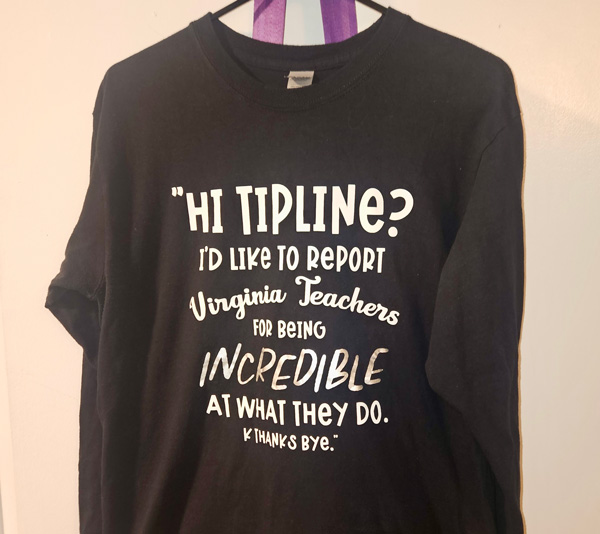The Education Department Asked for Reports of DEI. It Might Get Something Else
State tip lines have been targets for spam and personal grievances. They've also had a chilling effect on classroom instruction.
By Linda Jacobson | April 10, 2025In 2022, newly elected Virginia Gov. Glenn Youngkin launched a tip line for parents to report lessons that made children feel guilty about the color of their skin. His aim was to address growing conservative alarm about the proliferation of critical race theory and other so-called “divisive concepts” in the classroom.
But the result was something else.
Parents bombarded the dedicated email address with off-topic rants on issues from kids using outdated textbooks to districts that failed to pay for special education evaluations. In the end, the process likely attracted more critics than supporters to the governor’s cause. Singer John Legend urged Black parents to “flood” the governor with complaints about “history being silenced.” The state shut the tip line down nine months later, offering scant evidence of indoctrination.

A New Hampshire project met a similar fate. State officials disabled it last year after a federal judge ruled that the state’s 2021 “banned concepts” laws that restricted lessons on LGBTQ issues and racial history were too vague.
But in Oklahoma, a school safety alert system that Superintendent Ryan Walters uses to expose and punish what he calls the “radical left” hit its target. Five complaints pointed to books that Walters deemed “pornographic” in a district north of Oklahoma City. His accusation sparked a legal battle over whether the state chief could control the contents of school libraries.
Richard Cobb, superintendent of the Mid-Del Schools, outside Oklahoma City, called the online system “a huge overreach.”
“It’s frustrating because anyone can report anything,” he said. “Then the burden is on us to prove our innocence.”
And for many educators, there’s the rub — especially now that the Trump administration has made combating diversity, equity and inclusion an urgent national priority.
On Feb. 27, the U.S. Department of Education launched the End DEI portal. Its name leaves no doubt about its purpose — to uncover and eradicate examples of diversity, equity and inclusion in more than 100,000 schools across the nation. In a statement, Moms for Liberty co-founder Tiffany Justice urged parents to “share the receipts of the betrayal that has happened in our public schools.”
Trump made the issue a hallmark of his campaign, calling such policies “absolute nonsense” and “illegal.”
On the department’s portal, a simple online form invites parents to report “illegal discriminatory practices“ that the department will use to launch investigations.
But the department didn’t say what made DEI illegal, and the concept has proved notoriously difficult to define. Schools have implemented race-focused activities like privilege walks in elementary school, drawing backlash from parents who say the lessons make their children feel ashamed. But others have blocked lessons of clear historical significance, such as a movie about Ruby Bridges, the first Black child to attend a school in New Orleans.
Even in its attempt to eliminate DEI, the department has found the concept to be something of a moving target.
The launch of the portal followed a stern Feb. 14 warning from the Office for Civil Rights that districts could face investigation if they treat “students differently on the basis of race.” In response, some teachers steered away from lessons on Black history. A day after unveiling the portal, however, officials followed up with a more toned-down memo, explaining that cultural observances like Black History Month and International Holocaust Remembrance Day would be acceptable as long as all students, regardless of race, are welcome to participate.
But the department recently resumed the offensive. Last week, it told states and districts to sign a document certifying that they have eliminated DEI practices or risk losing millions of dollars in federal funding. The department has since extended the deadline until April 24, said Madi Biedermann, a department spokeswoman.
New York is among a handful of states that has indicated it won’t sign. Washington state Superintendent Chris Reykdal called the department’s ultimatum “an assault on the autonomy of states” and said it would be “irresponsible” to sign the certification. California also seems to be leaning that way. In an emailed statement, the state education agency called the demand “another attempt to impose a national ideology on local schools by threatening to withhold vital resources for students.”
Adding to the outsize stakes is the way the Trump administration has weaponized the issue, canceling grants and firing staff connected with even tangential connections to DEI work. In some cases, it has used DEI as an excuse to challenge legitimate history and bolster thinly veiled discrimination. Using artificial intelligence to comb through over 1,000 web pages, the Pentagon eliminated references to notable achievements among minority members of the military. It later restored some of them. And in January, Trump blamed DEI for a fatal mid-air collision between a helicopter and a plane over the Potomac River.
Those who have worked in states that have implemented tip lines expect End DEI to meet with a similar flurry of confusion, tangents, spam, personal grievances — and a chill on important classroom discussions.
“I can see the parallel” with Oklahoma, Cobb said. “We’ve seen the Trump administration bully powerful law firms and Ivy League schools into submission. I imagine they would have zero qualms about applying similar pressure to individuals or school districts.”
‘Snitch line mentality’
The department’s move comes amid deep national divisions about DEI. A January poll by The Economist and YouGov found a roughly even split, with 45% in favor of ending such programs in government and schools, and 40% opposed.
As Trump took office on Jan. 20, another survey attempted to gauge the effects of critical race theory on classroom instruction. The results were similarly mixed. Fifty-eight percent of high school students reported that their teachers frequently make comments like, “We must be actively anti-racist,” while 42% responded that teachers support the Black Lives Matter movement. At the same time, 77% said their teachers either never or rarely made them feel uncomfortable about disagreeing with their point of view.
Brian Kisida, a government and public affairs professor at the University of Missouri and a lead author of the study, said the department’s portal could give parents a vehicle for reporting actual discrimination against their children. But he expressed concern that the likely result would be to magnify the polarization it is designed to eradicate, saying “this snitch line mentality can do more harm than good.”
“I expect many of these disputes could be solved if parents and educators just had good-faith conversations with each other, and both sides would likely learn something in the process,” he said.
Some wonder how the department can thoughtfully navigate the issues, given the dramatic cuts to the program that normally would have been responsible for investigating discrimination complaints: the department’s civil rights office.
Education Secretary Linda McMahon eliminated half of the OCR staff along with seven regional offices that handle investigations. With its remaining employees, the department redirected civil rights enforcement toward administration priorities like ending antisemitic protests on college campuses and keeping transgender students out of girls’ sports.
“If you’re dismantling the Department of Education and moving everything somewhere else, who are these people that are going to do the investigation?” asked LaToya Baldwin Clark, a law professor at the University of California Los Angeles who tracks anti-CRT legislation. “Who are these people that actually do any type of enforcement?”
Biedermann, the department spokeswoman, would not say who is reviewing the submissions or whether officials have followed up on any tips. But unlike the Department of Defense, she said staff members at the department — not AI — will review submissions to identify potential areas for investigation. Biederman offered no information on how many reports the system has received, but Marleigh Schaefer, a spokeswoman for Moms for Liberty, said “thousands of parents have submitted to the portal.”

One of them is Lauren McDonough, part of a Texas conservative group called Families Engaged.
In her complaint to the department, she described her failed attempts to get the Richardson Independent School District to pass a policy requiring students to use bathrooms that match their sex assigned at birth. She became concerned after learning that a trans girl in first grade attends her daughters’ school. In an email, a district official told her that schools consider transgender students’ requests on a case-by-case basis.
“I was like ‘What the heck, it takes five minutes,’ ” McDonough said of the form. “If something comes of it, great, but my hopes are very low. I feel like I have to exhaust my resources as a parent.”
Biedermann said people who make submissions shouldn’t necessarily expect a response and described the portal as a “tool to identify where and if there are pockets or patterns of … violations.”
Not surprisingly, the site, created by staff from billionaire Elon Musk’s Department of Government Efficiency, fell prey to pranks. “Y’all know what to do …Copy the Bee Movie script,” one critic posted on X — a reference to an internet joke about sending the entire script from the 2014 movie to crash a site. Three former staffers at the department said in the rush to get the portal up, the site went down within 12 hours.
“We were laughing about it,” said a former employee who asked to remain anonymous to protect colleagues still at the department.
Biedermann acknowledged that the portal was initially overwhelmed, but said it resumed operations in about an hour and is now working smoothly.
‘Name names’
In Virginia, Youngkin set up his special email address to make good on a promise to listen to parents’ concerns. His successful run for governor in 2021 tapped into deep anger over remote learning and fears that critical race theory was infiltrating classrooms. An academic principle usually reserved for graduate schools, CRT argues that racism is built into the fabric of American institutions.

As governor, Youngkin’s first executive order banned classroom lessons based on CRT. On a conservative radio show, he promoted the tip line as a way to track down “inherently divisive teaching practices.”
He called out the Fairfax County district for a high school English assignment, titled Privilege Bingo, that was intended to teach students about diverse perspectives. The squares on the bingo card listed features such as being white, Christian, male and able-bodied. On the local news, an Army veteran complained that the lesson listed being part of a military family as an example of privilege. The district apologized and revised the activity, but said it remained committed to teaching students how to understand multiple viewpoints. Youngkin pledged to wipe out similar lessons from Virginia classrooms.
“We’re going to make sure that we catalog it all,” he said.
But the effort didn’t go as planned. Teachers in the Prince William County district, next to Fairfax, thought it was a joke. They even ordered custom T-shirts that read “Hi tip line? I’d like to report Virginia teachers for being incredible at what they do. Thanks Bye.”

“We just couldn’t believe that they were going to spend tax dollars to run this tip line, but not fully fund our schools to decrease class sizes,” said Angie Trerotola, a high school social studies teacher in Prince William.
Saturday Night Live’s Weekend Update got into the act. Co-anchor Colin Jost quipped, “You know you’re racist when you call the cops about a Black character in a book.”
In response to public records requests, the governor’s staff initially refused to release submissions to the tip line. But when several news outlets sued, the governor turned over 350 emails as part of a settlement, few of which pointed to lessons Youngkin was trying to eliminate. A spokesman referred The 74 to a statement it released in the fall of 2022 explaining that it discontinued the tip line because it was “receiving little to no volume.”

A similar tip line in Rhode Island also failed to gain traction. The Rhode Island Center for Freedom and Prosperity, a nonprofit, launched one at the height of outrage and confusion over how schools were teaching racial issues. It called on parents to “‘name names’ of those indoctrinating our kids.”
The free market think tank and the conservative Civics Alliance collaborated on a 2023 report that said state social studies standards are “animated by a radical identity-politics ideology” and show “hostility toward America.” The standards expect students to study Latino history, workers’ rights and feminism, they wrote, but distort “history where white men played the leading roles.”
More recently, Mike Stenhouse, the center’s CEO, warned state officials that a policy that recognizes transgender students and protects their decision to use restrooms and locker rooms that align with their gender identity puts them at risk of a civil rights investigation by the Trump administration.
But after four years, the group’s tip line had nothing to show for it, Stenhouse said in an email. The line “has not yielded any notable results” or received many “credible responses,” he said. Stenhouse blamed the lack of participation on the center’s failure to adequately promote the site.
‘Soup du jour’
In Oklahoma, Superintendent Walters has had more success getting the public’s help. His predecessor, Joy Hofmeister, launched a website called Awareity to report school security risks. Walters turned to it to seek out educators and districts violating a state law banning divisive concepts and his own mandates.
Five complaints last year focused on two books in the Edmond School District’s high school libraries. The Kite Runner by Khaled Hosseini, is an award-winning bestseller about an Afghan boy’s relationship with his father set against the backdrop of the Soviet-Afghan war, and The Glass Castle by Jeannette Walls is a memoir about growing up in a dysfunctional family. Both books include descriptions of sexual assault.
Walters threatened to downgrade the district’s accreditation if they didn’t remove them. When the district sued over his rule, Walters said it had chosen to “peddle porn and is leading the charge to undermine parents in Oklahoma.”
Cobb, the Mid-Del superintendent, didn’t pull the books, but others preemptively removed the titles and similar ones Walters labeled “filth.”
“I guess we all have to make our own decisions,” Cobb said. “But I’d rather stand up and fight than comply in advance with something that is wrong.”
Walters lost the case Edmond brought against him last year. The Oklahoma Supreme Court accused the superintendent of acting with “unauthorized quasi-judicial authority” and said decisions over library materials are up to local districts.

The option to report “pornographic materials or sexualized content” no longer appears in Awareity’s dropdown menu. The public also can no longer use it to report that a teacher is violating the state’s divisive concepts law. Last June, a federal judge temporarily blocked parts of the legislation, finding some of the language confusing for teachers to follow.
But Walters has a new use for Awareity. The public can report a “violation of religious liberty and patriotism rights.” Those categories complement his controversial mandate for teachers to use the Bible in the classroom and guidance that students should be allowed to fly and display the American flag at school “without infringement.”
“It’s like the soup du jour — whatever issues seem to be playing well at the current time,” said Brendon Hoover, coordinator at the Kirkpatrick Policy Group, which advocates for schools having full-time librarians.
He worked with Oklahoma Appleseed for Law and Justice, a nonprofit law firm, to file an open records request for Awareity files. Complaints included objections to schools offering Stamped, by anti-racist author Ibram Kendi, and a middle school book fair featuring selections from the LGBTQ-themed Heartstopper series of graphic novels.
The Oklahoma Department of Education did not respond to questions about Awareity.
Hoover blames the current atmosphere surrounding classroom instruction for contributing to an exodus of teachers from the profession and the state. Last year, Oklahoma approved nearly 4,700 emergency certifications for teachers to fill vacancies, breaking a previous record, the Oklahoma Voice reported.
“Oklahoma has a huge teacher shortage,” Hoover said, “and it’s because teachers are under attack by their own state Superintendent.”
One former Oklahoma health teacher got tired of being a target. Describing herself as a “blue drop in a red sea,” she said the threat of being reported for discussing racial issues was one reason she left the classroom in 2022. She stopped teaching a lesson about how the slave trade likely contributed to Black Americans’ genetic predisposition to certain diseases like diabetes and high blood pressure. After parents complained, an administrator encouraged her to drop the material from her curriculum.
“What the parents heard was, ‘White folks did this to Black folks,’ ” said the teacher, who asked to remain anonymous to protect future job prospects.
UCLA’s Clark said she expects the new End DEI portal to create a similar chill.
“These mechanisms to surveil and to monitor teachers and principals are ripe for reports that are not serious or not given in good faith,” she said. Ultimately, she said, “the purpose is to get people to self-censor.”
Get stories like these delivered straight to your inbox. Sign up for The 74 Newsletter

